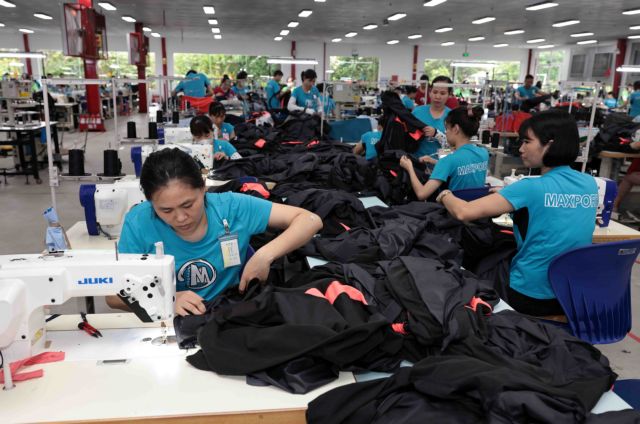.jpg) Society
Society

 |
| Textile workers at Tainan Vietnam Company in Long An Province. VNA/VNS Photo |
HÀ NỘI — While Việt Nam is aiming at developing high-quality human resources, the country’s labour market has a shortage of skilled and experienced workers.
Experts pointed out that the shortage has significantly affected the labour productivity increases.
Human resources are considered the most important asset of a country and investment in people is always a must in the nation’s socio-economic development.
Highly-skilled human resources help improve production efficiency, minimise waste and optimise work processes. Highly skilled experts and engineers are capable of developing new products, improving processes, creating added value for businesses and the economy. This is an important factor in attracting foreign investment, helping Việt Nam become an attractive destination for investors.
However, in 2023, just 27 per cent of Vietnamese workers were trained or had degrees and certifications. The Ministry of Labour, Invalids and Social Affairs estimates that 38 million workers nationwide were still untrained by the end of 2023.
Compared to many nations in the region, Việt Nam's labour productivity is lower due to the level of education of its trained workforce, which is primarily equivalent to junior high school.
Approximately 75 per cent of workers are enrolled in primary training that lasts less than three months.
Associate Professor Đinh Trọng Thịnh at the Academy of Finance, said foreign investors to Việt Nam seek out native human resources with high levels of management and administration skills in both production and business.
Even if they pay well and offer good working conditions, finding highly skilled employees is still exceedingly challenging. For many years, enterprises and huge companies in the nation have struggled to find a high-quality staff, he said.
According to Thịnh, producing high-quality employees requires a blend of theoretical instruction and hands-on management activities, particularly employee self-improvement and self-study.
"Education and training must adapt to the current curriculum and the times. Employees must retrain the majority of graduates. School-based training is crucial, but it just covers theory. Workers must self-study and enhance their qualifications and skills to adapt to particular occupations in order to stay competitive, he told Voice of Vietnam (VOV).
Dr Đinh Việt Hòa, chairman of the National Start-up Association, said the Vietnamese labour force has experienced both surplus and scarcity for a long time.
He claimed that Việt Nam lacks high-quality human resources, using Long Thành Airport Group as an example of a company that struggles to find such workers while paying up to half a billion đồng a month.
In contrast to this situation, Việt Nam is confronted with a surplus of unskilled human resources. Each year, millions of people graduate. Instead of giving students the chance to obtain real-world experience, universities mostly concentrate on academic instruction, he said.
According to him, graduates are only able to fulfill the fundamental needs of many companies.
With 99 per cent of them under 40, the majority of Vietnamese businesses are young. Enterprises mostly focus on creating service elements as well as production for each topic that are simple in nature, do not require high intellectual resources, leading to the lack of opportunities for Vietnamese human resources to enhance skills, he said.
Businesses must encourage human resource training within their own organisations in order to get past current constraints. High-quality human resources can fully satisfy the demands of foreign firms, which pay salaries that are far greater than those of Vietnamese businesses, if they also match the expectations of local employers, he said.
In order to meet the demands of human resources and capacity, as well as to gradually close the gap between supply and demand, universities should provide training based on business orders and consumer wants, he said.
He recommended Vietnamese workers should also focus more on training, foreign language proficiency and communication skills development in order to increase their professional working capacity and have more opportunities to obtain practical experience. — VNS




